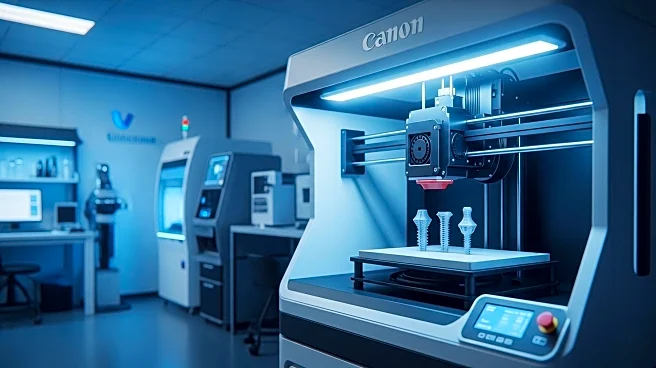What is the story about?
What's Happening?
The Department of Science and Technology (DoST) has inaugurated its first Advanced Manufacturing Center (AMCen) in the Zamboanga Peninsula, focusing on healthcare innovation through 3D printing technologies. This facility, co-founded by Dr. Moritz Soliven, aims to tackle the shortage of specialized surgical tools and the high cost of imported implants. The center is already producing customized biomedical devices at the Zamboanga City Medical Center, using polyether ether ketone (PEEK) as an alternative to titanium for implants due to its flexibility, body compatibility, and affordability. The initiative is drawing interest from various medical specialties, including collaborations with neurosurgeons and UP-PGH’s thoraco-vascular surgery department. The center also supports nursing students in developing medical prototypes, with potential for commercialization pending regulatory approvals.
Why It's Important?
The establishment of the AMCen in Zamboanga represents a significant advancement in personalized medicine and healthcare innovation. By utilizing 3D printing technology, the center addresses critical shortages in specialized surgical tools and offers cost-effective alternatives to expensive imported implants. This development could lead to transformative breakthroughs in healthcare, particularly in regions with limited access to specialized medical services. The initiative not only enhances local manufacturing capabilities but also fosters research and development among faculty, industry partners, and students, potentially creating a new niche market for Philippine-made biomedical devices.
What's Next?
The AMCen is poised to expand its focus from plastic-based prototypes to metal-based 3D printing applications, which could open new opportunities for local industries in manufacturing and product design. As the center continues to develop, regulatory approvals from the Food and Drug Administration and ISO are pending, which are crucial for the commercialization of its products. The success of this initiative could encourage further investment in similar facilities across the Philippines, enhancing the country's capacity to produce innovative healthcare solutions domestically.
Beyond the Headlines
The launch of the AMCen highlights the potential for 3D printing technology to revolutionize healthcare by providing personalized medical solutions tailored to individual needs. This approach not only addresses the economic barriers faced by patients but also promotes ethical considerations in healthcare accessibility. The initiative underscores the importance of fostering local innovation and collaboration among medical professionals, researchers, and students, which could lead to long-term shifts in the healthcare landscape.

















